Грег Иган - Distress
Здесь есть возможность читать онлайн «Грег Иган - Distress» весь текст электронной книги совершенно бесплатно (целиком полную версию без сокращений). В некоторых случаях можно слушать аудио, скачать через торрент в формате fb2 и присутствует краткое содержание. Жанр: Фантастика и фэнтези, на английском языке. Описание произведения, (предисловие) а так же отзывы посетителей доступны на портале библиотеки ЛибКат.
- Название:Distress
- Автор:
- Жанр:
- Год:неизвестен
- ISBN:нет данных
- Рейтинг книги:3 / 5. Голосов: 1
-
Избранное:Добавить в избранное
- Отзывы:
-
Ваша оценка:
- 60
- 1
- 2
- 3
- 4
- 5
Distress: краткое содержание, описание и аннотация
Предлагаем к чтению аннотацию, описание, краткое содержание или предисловие (зависит от того, что написал сам автор книги «Distress»). Если вы не нашли необходимую информацию о книге — напишите в комментариях, мы постараемся отыскать её.
Distress — читать онлайн бесплатно полную книгу (весь текст) целиком
Ниже представлен текст книги, разбитый по страницам. Система сохранения места последней прочитанной страницы, позволяет с удобством читать онлайн бесплатно книгу «Distress», без необходимости каждый раз заново искать на чём Вы остановились. Поставьте закладку, и сможете в любой момент перейти на страницу, на которой закончили чтение.
Интервал:
Закладка:
I had no wish to abandon either, but if what I’d failed at so badly, again and again, had been reconciling the two …
If the choice came down to biology or civilization … I knew, now, which I valued the most. And asex could still be close. Asex could still touch. After a while, we climbed into the sleeping bag to keep warm. I was still numb with despair at the tragedy of Stateless, Mosala’s senseless half-murder, the ruins of my career. But Akili kissed me on the forehead, and tried vis best to unknot my aching back and shoulders—and I did the same for ver, in the hope that it might make vis fear of the great information plague, which I still did not believe was coming, in some small way easier to bear.
I woke, confused, to the sound of Akili breathing beside me. The tent was bathed in gray and blue light, shadowless as noon; I looked up and saw the disk of the moon overhead, a white spotlight penetrating the weave of the roof, rainbow-fringed by diffraction.
I thought: Akili met me outside the airport. Ve could have infected me with the engineered cholera then, knowing that I’d carry it to Mosala.
And when the weapon misfired, ve’d produced the antidote—to gain my trust, in the hope that ve could use me a second time… but then the moderates had unwittingly kidnapped us both, and there’d been no need to strike at Mosala again.
It was sheer paranoia. I closed my eyes. Why would an extremist pretend to believe in the information plague? And if the belief was genuine, why kill Buzzo when the Aleph moment had been proved inevitable? Either way, with Mosala back in Cape Town—and her work proceeding, with or without her—what use could I be to the extremists?
I disentangled myself, and climbed out of the sleeping bag. Akili woke while I was dressing, and muttered sleepily, "The latrine tent glows red. You can’t miss it."
"I won’t be long."
I walked aimlessly, trying to clear my head. It was earlier than I’d imagined, barely after nine, but shockingly cold. Lights still showed from most of the tents, but the alleys between them were deserted.
Akili as an extremist assassin made no sense—why would ve have struggled to get us off the fishing boat?—but the doubt I’d felt on waking still cast a shadow over everything, as if my mistrust itself was as much of a disaster as any possibility that I could be right. How could we have been through so much together—only for me to wake beside ver, wondering if it had all been a lie?
I reached the southern edge of the camp. These people must have been the last wave of refugees to head north, because there was nothing in sight but bare reef-rock, stretching to the horizon.
I hesitated, and almost turned back. But pacing the alleys made me feel like a spy—and I wasn’t ready to return to Akili’s tent, to the warmth of vis body, to the hope ve seemed to offer. Half an hour before, I’d seriously considered migrating to total asex—tearing out my genitals and several vital pieces of gray matter—as the panacea for all my woes. I needed to take a long walk, alone.
I headed out into the moonlit desert.
Whorls of trace minerals glittered everywhere; now that I’d seen a few of these hieroglyphs deciphered, the ground appeared transformed, dense with meaning—although for all I knew, most of the patterns could still have been nothing but random decoration.
The abandoned city was either in darkness, or hidden from view by the slope of the ground; I could see no hint of light on the southern horizon. I pictured a fresh swarm of the invisible insects scurrying out from their nest at the center… but I knew I’d be no safer back in the camp— and the things only killed for the spectacle of it, for the panic they instilled. Alone, I was less of a target than ever.
I thought I felt the ground shudder—a tremor so slight that I doubted it immediately. Was there still shelling going on? I’d imagined everyone leaving the city to the mercenaries—but maybe a few dissenters had ignored the evacuation plan… or maybe the militia had remained, in hiding, and the real confrontation had finally begun. That was a dismal prospect; they didn’t stand a chance.
It happened again. I couldn’t judge the direction of the blast—I’d heard no sound at all, just felt the vibration. I turned a full circle, scanning the horizon for smoke. Maybe they were shelling the camps, now. The white plumes over the city in the morning had been visible for kilometers—but shells meant for tents on bare rock would carry different charges, with different effects.
I kept walking south, hoping that the city would come into view along with some sign that the pyrotechnic action was still confined there. And I tried to imagine myself living through the war, emerging unscathed, but cozily familiar with all the myriad technologies of death… offering—to the nets who didn’t care what I’d faked—footage complete with my own now—expert commentary on "the characteristic sound of a Chinese-made Vigilance missile meeting its target," or "the unmistakable visual signature of a Peacetech forty-millimeter shell exploding over open ground."
I felt a wave of resignation sweep over me. I’d swallowed too many dreams in the last three days: technoliberation, an end to the gene patent laws… personal happiness, asexual bliss. It was time to wake up. The ordinary madness of the world had finally reached Stateless—so why not stand back, regain some perspective, and try to scrape some kind of a living out of it? The invasion was no greater tragedy than ten thousand other bloody conquests before it—and it had always been inevitable. War had come, one way or another, to every known human culture.
I whispered aloud, without much conviction, "Screw every known human culture."
The ground roared, and threw me.
The reef-rock was soft, but I hit it face-down, bloodying my nose, maybe breaking it. Winded and astonished, I raised myself onto my hands and knees, but the ground still hadn’t stopped shaking, I didn’t trust myself to stand. I looked around for some evidence of a nearby impact—but there was no glow, no smoke, no crater, nothing.
Was this the new terror? After invisible robots—invisible bombs?
I knelt, waited, then climbed to my feet unsteadily. The reef-rock was still reverberating; I paced in a drunken circle, searching the horizon, still refusing to believe that there could be no other sign of the blast.
The air had been silent, though. It was the rock which had carried the noise. An underground detonation?
Or undersea, beneath the island?
And no detonation at all—
The ground convulsed again. I landed badly, twisting one arm, but panic washed out everything, dulling the pain into insignificance. I clawed at the ground, trying to find the strength to deny every instinct which screamed at me to stay down, not to risk moving—when I knew that if I didn’t stand—and then sprint faster across the shuddering dead coral than I’d ever moved in my life—I was lost.
The mercenaries had killed off the lithophiles which gave the reef-rock its buoyancy. That was why they’d driven us out of the city: only the center of the island would hold. Beyond the support of the guyot, the overhang was sinking.
I turned to try to see what had happened to the camp. Blue and orange squares gazed back at me blankly; most of the tents were still standing. I could see no one moving out across the desert yet—it was too soon—but there was no question of going back to warn them. Not even Akili. Inland divers would surely understand what was happening, faster than I had. There was nothing I could do now but try to save myself.
I climbed to my feet and broke into a run. I covered about ten meters before the ground shifted, slamming me down. I got up, took three steps, twisted an ankle, fell again. There was a constant tortured cracking sound filling my head now, conducted through my body from reef-rock to bone, resonating from living mineral to living mineral—the underworld reaching up to me, sharing its disintegration.
Читать дальшеИнтервал:
Закладка:
Похожие книги на «Distress»
Представляем Вашему вниманию похожие книги на «Distress» списком для выбора. Мы отобрали схожую по названию и смыслу литературу в надежде предоставить читателям больше вариантов отыскать новые, интересные, ещё непрочитанные произведения.
Обсуждение, отзывы о книге «Distress» и просто собственные мнения читателей. Оставьте ваши комментарии, напишите, что Вы думаете о произведении, его смысле или главных героях. Укажите что конкретно понравилось, а что нет, и почему Вы так считаете.
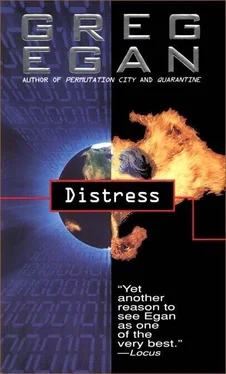

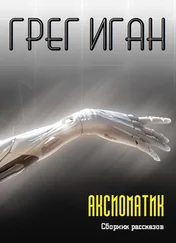

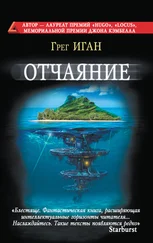
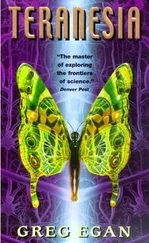
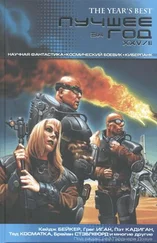

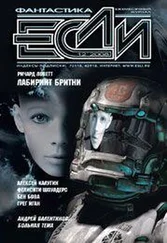
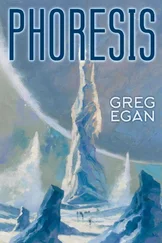
![Грег Иган - Рассказы [компиляция]](/books/419837/greg-igan-rasskazy-kompilyaciya-thumb.webp)
